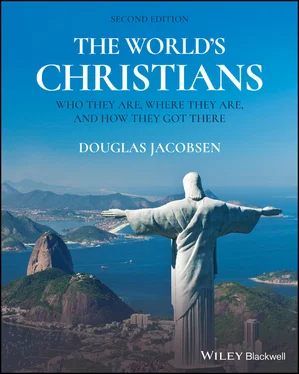From the beginning of the movement, Protestant spirituality has included the singing of hymns. Sometimes hymns were written for the purpose of educating Protestant laypeople – a way of communicating Protestant doctrine memorably and understandably – and worship leaders in some Protestant churches tell their congregants to “think about the words you are singing.” Other Protestant hymns are testimonies of personal experience. No hymn illustrates this more than Amazing Grace , which was written by John Newton (1725–1807), a former slave trader who later became an Anglican priest. The emotions of Newton’s own dramatic conversion experience saturate the lyrics: “Amazing grace, how sweet the sound that saved a wretch like me! I once was lost but now am found, was blind but now I see.” Hymn singing gives Protestants, who are often more idea‐centered than emotional, an outlet for expressing their religious feelings, and no one provided more hymns for Protestant Christians than Fanny Crosby (see Voices of World Christianity 3.1).
Hymn singing as a Protestant practice peaked in Europe and North America during the late nineteenth and early twentieth centuries when pianos became common in homes and churches. Starting in the 1960s and 1970s, guitars (and later drums) began to be used more frequently, and this was accompanied by a shift away from classical hymns to newer “praise songs” led by a “worship band” with the lyrics of the song projected onto a screen at the front of the church. The popularity of praise songs, which are now used by Protestants worldwide, has not been uncontested. Some Protestant churches have refused to make the shift and still use only classic hymns in their services. Other congregations now mix styles of music or hold separate “traditional” (hymn singing) and “contemporary” (praise song) worship services to accommodate different musical tastes. The region of the world where Protestant singing has probably had (and continues to have) the biggest impact is Africa. In the early twentieth century, the hymns of Ntsikana, a Xhosa prophet from southern Africa, helped Africans to see that they could remain genuinely African even if they became Christians. In more recent years in South Sudan, new hymns, many of them written by women, played a crucial role in the mass conversion of the Dinka people to Christianity.
The Protestant vision of salvation is simultaneously intimate and austere. It is intimate because salvation focuses on the personal relationship between the believer and God. It is austere because the individual has to face God in stunning isolation. Within Protestantism, Jesus is frequently portrayed as the friend of sinners, who is ready and willing to embrace all who turn to him. Salvation is a joyful homecoming. One by one, individual by individual, God redeems humanity, freeing people from the burden of their sins and befriending each one in turn. The only requirement is faith. The gift of salvation is free, with no cost beyond placing one’s full trust and confidence in God (see Voices of World Christianity 3.2). Protestants have also, however, said that each person has to face God alone. The saints of the past cannot intervene, and Mary cannot mediate. Anxiety can be further heightened by Protestantism’s bleak assessment of the unredeemed condition of humankind. People are declared to be “lost,” they are “worms in the dust,” they are “totally depraved.” In the famous words of Jonathan Edwards (1703–58), the American Puritan preacher, humans need to recognize that they are “sinners in the hands of an angry God” before they can appreciate the breadth of God’s grace. Meeting God on those terms can be terrifying.
Voices of World Christianity 3.1 Fanny Crosby and Protestant Hymnody
 Frances Jane van Alstyne(1820–1915), who is better known by the name Fanny Crosby, is the most prolific hymn writer of all time. She was a Baptist, but her songs appealed to Protestants of all stripes. Crosby was blind from infancy and served briefly as a lobbyist for the sightless in Washington, DC, but her lifelong vocation was writing. She composed her first hymn in 1844 and during the next six decades she penned 8,000 more. Her poems and song lyrics became so popular that some publishers used aliases (including Henrietta E. Blair, Ellen Dare, Grace Lindsey, Wilson Meade, and Hope Tryaway) to make it appear that they were drawing from a wider base of writers. While Crosby’s hymns touch on many different subjects, the believer’s emotional connection with God was especially prominent. That theme is evident in two of her most popular songs, which are excerpted here.
Frances Jane van Alstyne(1820–1915), who is better known by the name Fanny Crosby, is the most prolific hymn writer of all time. She was a Baptist, but her songs appealed to Protestants of all stripes. Crosby was blind from infancy and served briefly as a lobbyist for the sightless in Washington, DC, but her lifelong vocation was writing. She composed her first hymn in 1844 and during the next six decades she penned 8,000 more. Her poems and song lyrics became so popular that some publishers used aliases (including Henrietta E. Blair, Ellen Dare, Grace Lindsey, Wilson Meade, and Hope Tryaway) to make it appear that they were drawing from a wider base of writers. While Crosby’s hymns touch on many different subjects, the believer’s emotional connection with God was especially prominent. That theme is evident in two of her most popular songs, which are excerpted here.
Excerpt from “Blessed Assurance, Jesus Is Mine” (1873):
(verse one) Blessed assurance, Jesus is mine!
O what a foretaste of glory divine!
Heir of salvation, purchase of God,
Born of his Spirit, washed in his blood.
(chorus) This is my story, this is my song
Praising my Savior all the day long.
(verse two) Perfect submission, perfect delight
Visions of rapture now burst on my sight;
Angels descending bring from above
Echoes of mercy, whispers of love.
Excerpt from “I Am Thine, O Lord” (1875):
(verse one) I am thine, O Lord, I have heard thy voice,
And it told thy love to me;
But I long to rise in the arms of faith,
And be closer drawn to thee.
(chorus) Draw me nearer, nearer, blessed Lord,
To the cross where thou hast died;
Draw me nearer, nearer, nearer, blessed Lord
To thy precious bleeding side.
(verse three) O, the pure delight of a single hour
That before thy throne I spend,
When I kneel in prayer, and with thee, my God,
I commune as friend with friend.
Hymns for Praise and Worship (Nappanee, IN: Evangel Press, 1984).
Protestants define sin in many different ways – as an expression of the innate egoism of human beings, as a transgression of God’s moral law, as a failure to act when action is required – but, however sin is defined, most Protestants use legal language to describe the result. People are “guilty” before God and that guilt must be addressed before a new and positive relationship with God can begin. Christ is sometimes described as humanity’s advocate in the court of heaven, pleading with God to forgive people’s sins based on the fact that Christ’s own death paid the full legal penalty for human sin.
Protestants are divided on the question of precisely who gets to be saved. One view, closely associated with the Reformed or Calvinist tradition, is predestination , which says God chooses some people for eternal salvation, while damning others to hell. This was the majority view for the first century or two of the Protestant movement, largely because predestination underscores the belief that salvation is a pure gift from God with no element of human choice or volition involved. Faith – believing and trusting in God – was necessary to obtain salvation, but faith itself was seen as a gift that God only gave to some. Over time, however, many Protestants came to view predestination as being out of synch with their vision of God as a God of love. They argued that because of that love God offers salvation to everyone, and it is then each person’s choice to accept or reject that offer. This alternative view was first articulated by the Dutch theologian Jacob Arminius (1560–1609), and it has been called Arminianism ever since. The great majority of Protestants in the world today affirm this Arminian or “free will” understanding of salvation, but a third option is gaining ground. That third option is universalism , and it combines predestination’s emphasis on God’s choice with Arminianism’s vision of God as love. According to this view, God by God’s own choice will eventually redeem everyone from sin and grant them eternal life. Whether they like it or not, everyone will eventually be saved.
Читать дальше

 Frances Jane van Alstyne(1820–1915), who is better known by the name Fanny Crosby, is the most prolific hymn writer of all time. She was a Baptist, but her songs appealed to Protestants of all stripes. Crosby was blind from infancy and served briefly as a lobbyist for the sightless in Washington, DC, but her lifelong vocation was writing. She composed her first hymn in 1844 and during the next six decades she penned 8,000 more. Her poems and song lyrics became so popular that some publishers used aliases (including Henrietta E. Blair, Ellen Dare, Grace Lindsey, Wilson Meade, and Hope Tryaway) to make it appear that they were drawing from a wider base of writers. While Crosby’s hymns touch on many different subjects, the believer’s emotional connection with God was especially prominent. That theme is evident in two of her most popular songs, which are excerpted here.
Frances Jane van Alstyne(1820–1915), who is better known by the name Fanny Crosby, is the most prolific hymn writer of all time. She was a Baptist, but her songs appealed to Protestants of all stripes. Crosby was blind from infancy and served briefly as a lobbyist for the sightless in Washington, DC, but her lifelong vocation was writing. She composed her first hymn in 1844 and during the next six decades she penned 8,000 more. Her poems and song lyrics became so popular that some publishers used aliases (including Henrietta E. Blair, Ellen Dare, Grace Lindsey, Wilson Meade, and Hope Tryaway) to make it appear that they were drawing from a wider base of writers. While Crosby’s hymns touch on many different subjects, the believer’s emotional connection with God was especially prominent. That theme is evident in two of her most popular songs, which are excerpted here.










